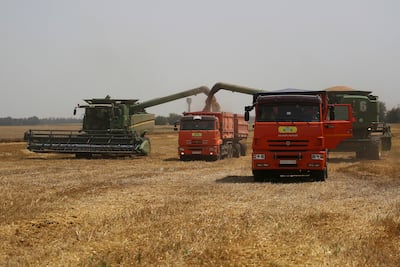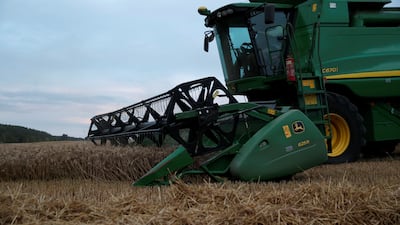British farmers are cashing in on soaring wheat prices by selling stored grain at higher rates, as Ireland urges its farmers to grow more and the G7 hosts an emergency meeting to tackle food security.
Irish dairy and beef farmers are being encouraged to start growing crops, while agriculture ministers from G7 countries including Britain’s George Eustice are set to meet on Friday to discuss grain shortages and food price volatility following Russia’s invasion of Ukraine.
Farmers in the UK who managed to store grain over the winter months are securing sky-high prices on grain they sell now, but challenges lie ahead as the cost of fertiliser needed to grow this year’s crops has also risen.
“I don't want to sound too enthusiastic because it's a terrible situation we're in at the minute, but the wheat price is really good. And luckily, we held a bit back in store to sell in the spring,” Richard Heady, a farmer who grows wheat, oats, barley and beans near Milton Keynes in Buckinghamshire, told the BBC.
“We find we can quite often get quite good prices by holding on to it quite late to the spring and it has definitely paid off this year. We've got £300 [$394] a tonne for that milling wheat at the moment, which is probably towards three times more than we've got a couple of years ago.”
Mr Heady said he was very “surprised” by how high the price of wheat is.
“We can often get perhaps a £20 premium by holding on to it. But this year, it's been a £150 premium by keeping hold of it,” he added.
The cost of wheat along with other vital foodstuffs and metals has soared since the invasion, as Ukraine and Russia supply 30 per cent of global wheat and barley.
On Wednesday, Ukraine, once known as the breadbasket of Europe, said it was banning exports of rye, barley, buckwheat, millet, sugar, salt and meat for the rest of the year.
They are now fears of shortages not seen since the Second World War when consumers in Britain were encouraged to plant vegetables in gardens, yards and on rooftops.
Environment Secretary George Eustice told MPs on Thursday that the UK is “largely self-sufficient in wheat” but noted “we do import certain vegetable oils from Ukraine”.
“I will attend a special meeting of the G7 to discuss these issues further,” he said.
Ukraine supplies 20 per cent of the UK’s cereals, according to official data, with the price of wheat futures — grain to be bought on May 22 — hitting £306 a tonne on Thursday. On February 18, days before the war started, it was trading at £220 a tonne.
Prices are expected to remain elevated for as long as the conflict rages in Ukraine, according to the Economist Intelligence Unit, with wheat futures hitting a 14-year high on March 1 when panic buying set in.
“The conflict will have a significant impact on global grain supplies, especially as stocks are already low. The war in Ukraine will also affect the upcoming sowing of crops in the country, which in turn will lead to supply shortfalls next year,” said the EIU.
“Traders will look for alternative supplies from major producers such as the US, India and Argentina, but the necessary supply response will take time to materialise. We expect average grain prices to rise by almost a third this year, on top of the 40 per cent increase recorded in 2021.”
Irish farmers are already stepping up to the challenge of growing extra grain to help the country deal with supply line disruption from Ukraine, according to Agriculture Minister Charlie McConalogue.
Irish farming is dominated by beef and dairy producers and is heavily reliant on imported grain, with around 60 per cent of the 5.5 million tonnes used in the country every year sourced from overseas. It is used both in products for human consumption and for animal feed.
Russia also supplies more than 20 per cent of fertiliser used in the country.
The demand for Irish farmers to grow more crops this year mirrors measures introduced in the country during the Second World War.
While Mr McConalogue said he was confident farmers are responding positively to the call, farmers are urging the government to issue €2,000 (£1,670) vouchers to help them fertilise the land for crops and winter fodder.
“Food security is really important over the next number of weeks and months and it is something we have to work together on,” Mr McConalogue said
In the UK, Daniel Zeichner, shadow minister in the Department for Environment, Food and Rural Affairs said while growing more wheat may boost food stocks in the UK in the short term, the government must address food security issues for the long term.
“Making sure that we produce more food in Britain is a key part of Labour's plan for the future. So we'd be doing it anyway but in the light of the current uncertainties around the world, it makes it even more important that that is addressed quickly,” Mr Zeichner said.

Farmers must also face much higher fertiliser costs with prices hovering around £1,000 a tonne for ammonium nitrate fertiliser, compared with £647 in January this year and £245 in January 2021, according to the Agriculture and Horticulture Development Board.
While the UK produces about 40 per cent of its own fertiliser, Russia is the world’s largest exporter. Ukraine war is expected to have a big effect on the supply chain and place even more pressure on the cost of groceries.
Earlier this week, Svein Tore Holsether, the head of Norwegian fertiliser maker Yara, warned Russia’s invasion of Ukraine will deliver a catastrophic hit to global food supplies.
Kit Papworth, a contract farmer in Norfolk, said higher fertiliser prices will make it very hard for UK farmers to consider growing more wheat to offset the risk of food shortages.
“There is no bonanza for farmers,” he told The National, with farmers forced to make difficult decisions across the UK every day.
“I think the opposite will happen, where we actually are so worried about being able to grow and fertilise this crop that actually we plant less and thereby exacerbate the problem,” he said.
“So we put less wheat in the ground, we have less fertiliser and we have lower yield yields, and then we have less crop to sell. And the world has less food just at a time where we could really do with some more.”
The challenge for farmers right now, he added, is that the 2022 crop is already in the ground and growing away with the potential for it to be sold at a high price.
“But we only have the fertiliser we have already purchased, and we have no idea whether we will be able to purchase any more fertiliser. So do I now fertilise the crop I have in the ground with the fertiliser I have but run the risk of having no fertiliser at all?
“Or do I cut back on fertiliser this season to have some for next year thereby reducing my yield and not having as much grain to sell into this very high price?”
The other challenge, said Mr Papworth, is the huge diesel bills farmers have face to run their farming vehicles as prices rise ever higher amid the energy crisis.
“So the margins [on growing wheat] are only back where they were in 2018 and 19. It's just that the cash risk is so much greater,” Mr Papworth said.
The wider issue, he added, is food security not only for the UK but across the world “because it is not likely that British people are going to starve, but there are countries in the world that rely on wheat being cheap".
“If I was in Sudan right now I'd be really worried about wheat being £300 a tonne because they import mostly from the Black Sea. And even if they could find another place to buy it from they wouldn't be able to afford it and people will die as a result of this war who are nowhere near this war. They will die of starvation,” Mr Papworth said.
“And we will see riots and disruption in the same way as we saw with the Arab Spring - the last time prices were anything like this.”











































